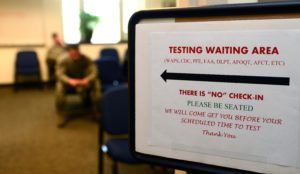
Along with everything else these days, FAA testing centers across the country have closed. But what does that mean for new pilots waiting to take their Part 107 Remote Pilots Certification test? What if your Part 107 Certification has expired, as they all do after 24 months, and requires renewal?
Kittyhawk.io‘s Andrew Elefant addresses these questions and more in a blog post about the effect of coronavirus closures on the Part 107 process. The short answer is that for now, according to the letter of the law, pilots whose Part 107 Certification expired in March can’t fly legally. If the crisis continues, more pilots could end up without valid Part 107 Certifications.
The FAA is working on it, Elefant says, and a solution may soon emerge:
The FAA is aware that these issues exist, and they are working on a solution.
One potential solution could be for the FAA to grant a temporary exemption for Part 107 operators who need to take the recurrent exam, allowing them to continue operating until testing centers are reopened as long as they continue to follow Part 107 regulations.
Another potential solution could be to allow those needing to take the recurrent exam to take the abbreviated online exam on the FAA website that current Part 61 pilots are able to take to add a Part 107 certification.
Unfortunately, neither of these solutions seem like an adequate replacement for the initial exam, but we hope the FAA will provide a way for aspiring Remote Pilots to take the initial exam and earn their Part 107.
In the meantime, Elefant points out that pilots whose certification is not current can still operate a UAS, as long as there is a current RPIC supervising the operation.
What if your business has been named critical and you still need to fly? Drone programs will need to use their best judgement, Elefant points out: “However, drone programs will have to evaluate the effect of grounding competent, non-current RPICs, and the level of risk to your operation if you have to ground multiple RPICs, especially if you’re operating an essential business with limited personnel,” he writes.
It’s one of the truly “unforeseen circumstances” of the current crisis – but one which the FAA should address soon.
Miriam McNabb is the Editor-in-Chief of DRONELIFE and CEO of JobForDrones, a professional drone services marketplace, and a fascinated observer of the emerging drone industry and the regulatory environment for drones. Miriam has penned over 3,000 articles focused on the commercial drone space and is an international speaker and recognized figure in the industry. Miriam has a degree from the University of Chicago and over 20 years of experience in high tech sales and marketing for new technologies.
For drone industry consulting or writing, Email Miriam.
TWITTER:@spaldingbarker
Subscribe to DroneLife here.







[…] Source link […]